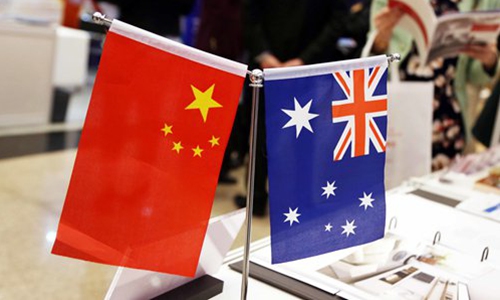Australia's travel ban betrays cultural traditions, encourages discrimination

Photo: IC
In spite of the fact that the World Health Organization (WHO) has unambiguously advised against unnecessary interfering and limiting international travel and trade amid novel coronavirus outbreak, Canberra haphazardly followed Washington's example of imposing border closure to students, tourists, business travelers and other visitors coming from the Chinese mainland.
Such insensitive overreaction is detrimental to the normal exchanges and frequent mobility which are of critical importance to the mutually beneficial cooperation between the two countries.
There are 260,000 Chinese students enrolled in schools and universities across Australia, generating AUD$12 billion annually to the country's economy. At this moment, almost 100,000 of them are being kept in limbo, unable to commence or resume their education onshore due to the abrupt imposition of the travel ban.
For those who have successfully entered the country by the closure date, some of the youngsters have been forcibly put in detention while the visas of some other students were arbitrarily and unfairly canceled. Self-conflicting policies and announcements further exacerbated the dire situation, baffling not only students and their parents, but also education providers in Australia.
WHO Director General, Dr Tedros Adhanom Ghebreyesus, rightly advised "all countries to implement decisions that are evidence-based and consistent." Australia's precipitous decree clearly runs against sensibility, while betraying its characteristically blind and senseless shadowing of US policies and practices with regard to China.
It is understood that the US has its own vested interest in taking advantage of the current health crisis to stir up another scaremongering campaign against China, which runs counter to the basic principles of morality and humanity. Washington's blatant conniving serves its long-term global strategy of containing and deterring China.
The epidemic emergency has been deemed as a good opportunity by some anti-China hawks to disrupt and impede China's development, while implementing deliberate decoupling with China in economic and technological terms.
By maliciously exploiting and negatively exaggerating the situation of the epidemic in China, some zero sum minded forces in the West are mounting a wave of attack on China.
The border closure was enforced using the excuse of necessary epidemic quarantine, with no evidence-based justification at all. The ulterior motive is to further stoke the infamous China threat theory so as to form an international united front to isolate China.
It is alarming that such malevolent approaches and practices have already provoked a new resurgence of racism. Around the globe, especially in some Western countries, there have been incidents of nonsensical smear and scare attempts to intimidate people with Chinese or merely Asian appearances. Reckless reference to the coronavirus as "Chinese virus" and demands that "China kids stay home" are blatantly headlined in some of Australia's media outlets. The Chinese community is increasingly facing the menace of stigmatization and demonization.
We see in Australia's border closure policy traces and resonance of America's strategies for the international isolation of China, which echoes Donald Trump's "America First" doctrine, with no regard to Australia's national interest.
The comprehensive strategic partnership between China and Australia ordains intrinsic and multi-faceted bilateral interdependence, which has been harvesting enormous benefits for both economies and societies.
Senseless blocking normal relations has the ominous prospect of derailing the sanguine development which hinges on trust and cooperation. It not only affects the students' education and life in Australia, but also sends them a message that would dent their faith in Australia as a compassionate country and supporting society.
China is the destination of one third of Australia's exports. In 2019, more than 1.3 million Chinese tourists visited Australia, spending as much as AUD$11.5 billion. It is easier to close the door, but it would not be as easy to restore the confidence of tourists, consumers and students in the future.
Australians boast their prideworthy spirit of mateship. At this time of a global health crisis, we look forward to Australia's empathetic and humane treatment of Chinese students and other visitors. We also expect Canberra to adopt a more positive and constructive outlook of bilateral relations.
The author is a professor and director of Australian Studies Center, East China Normal University. opinion@globaltimes.com.cn



